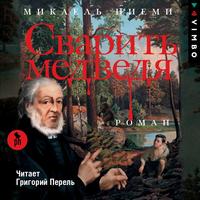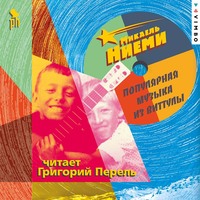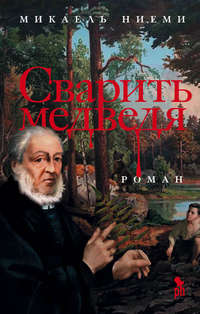
Полная версия
Popular Music
‘Matti.’
Then I pointed at him and waited. He also waited. I reached out and stuck my finger in between his lips. He opened his mouth, but still didn’t say anything. I started stroking his throat. It tickled, and he pushed my hand away.
‘Niila!’ I said, and tried to make him say it after me. ‘Niila, say Niila!’
He stared at me as if I were an idiot. I pointed at my crotch and said:
‘Willy!’
He grinned, thought I was being rude. I pointed at my backside.
‘Bum! Willy and bum!’
He nodded, then turned his attention back to the radio again. I pointed at his own backside and made a gesture to show something coming out of it. Then I looked at him questioningly. He cleared his throat. I went tense, waiting impatiently. But nothing happened. I was annoyed and wrestled him down to the floor.
‘It’s called babba! Say babba!’
He slowly extricated himself from my grip. Coughed and sort of bent his tongue around inside his mouth to loosen it up.
Then he said: ‘Soifa.’
I held my breath. That was the first time I’d ever heard his voice. It was deep for a boy, hoarse. Not very attractive.
‘What did you say?’
‘Donu al mi akvon.’
There it was again. I was flabbergasted. Niila spoke! He’d started talking, but I couldn’t understand what he said.
He rose to his feet with great dignity, walked over to the sink and drank a glass of water. Then he went home.
Something very remarkable had taken place. In his state of dumbness, in his isolated fear, Niila had started to create a language of his own. Without conversing, he had invented words, begun to string them together and form sentences. Or wasn’t it just him alone, perhaps? Could there be something deeper to it, embedded underneath the deepest peat layer at the back of his mind? An ancient language? An ancient memory, deep frozen but slowly starting to melt?
And before I knew where I was, our roles had been reversed. Instead of me teaching him how to talk, it was him teaching me. We would sit in the kitchen, Mum pottering around in the garden, the radio buzzing in the background.
‘Ĉi tio estas seĝo,’ he said, pointing at a chair.
‘Ĉi tio estas seĝo,’ I repeated after him.
‘Vi nomiĝas Matti,’ he said, pointing at me.
‘Vi nomiĝas Matti,’ I repeated, good as gold.
He shook his head.
‘Mi nomiĝas!’
I corrected myself.
‘Mi nomiĝas Matti. Vi nomiĝas Niila.’
He clicked his tongue enthusiastically. There were rules in this language of his, it was ordered. You couldn’t just babble on in any way you liked.
We began using it as our secret language, it grew into a space of our own where we could be all to ourselves. The kids from round about grew jealous and suspicious, but that only increased our pleasure. Mum and Dad got a bit worried and thought I was losing my powers of speech, but when they phoned the doctor he said that children often invented fantasy languages, and it would soon pass.
But as far as Niila was concerned, the blockage in his throat had been cleared once and for all. Our make-believe language overcame his fear of talking, and it wasn’t long before he started speaking Swedish and Finnish as well. He understood quite a lot already, of course, and had a big passive vocabulary. It just needed translating into sounds, and his mouth movements had to be practised. But it proved to be more difficult than one might have thought. He sounded odd for ages, his palate had trouble with all the Swedish vowels and the Finnish diphthongs, and he was constantly dribbling. Eventually it became possible to understand more or less what he was saying, although he still preferred to stick to our secret language. That was where he felt most at home. When we spoke it he would relax, and his body movements were less awkward, more natural.
One Sunday something unusual happened in Pajala. The church was full. It was a routine service, the clergyman taking it was Wilhelm Tawe as usual, and in normal circumstances there would have been plenty of room. But on this particular day it was full to overflowing.
The reason was that the inhabitants of Pajala were going to see their first real, live black man.
There was so much interest that even Mum and Dad were induced to turn up, despite the fact that they very rarely went to church at all apart from on Christmas Eve. In the pew in front of us were Niila and his parents and all his brothers and sisters. Just once he turned round and peered at me over the back of the pew, but was immediately prodded quite hard by Isak. The congregation included office workers and lumberjacks, and even a few Communists, all whispering amongst themselves. It was obvious what they were talking about. They were wondering if he’d turn out to be really black, pitch black, like the jazz musicians on record sleeves. Or would he just be a sort of coffee-brown?
There was a ringing of bells and the vestry door opened. Wilhelm Tawe emerged, looking a little bit on edge behind his black-framed spectacles. And there behind him. Also in vestments. A glittering African mantel, oh yes…
Pitch black! Whispers spread swiftly among the Sunday School mistresses. No trace of brown, more a sort of bluish black. Trotting alongside the African was an old deaconess who had been a missionary for many years, thin as a rake and with skin like tanned leather. The men bowed in the direction of the altar and the woman curtsied. Then Tawe got the service under way by bidding all present welcome, especially the guest who had travelled all the way from the war-stricken Congo. Christian parishes there were in crying need of material assistance, and today’s entire collection would be sent straight to the aid of our brothers and sisters in Africa.
Then the rituals commenced. But everybody just stared. They couldn’t take their eyes off him. When the hymn-singing started they heard his voice for the first time. He knew all the tunes, they seemed to have the same hymns in Africa. He sang in some native language or other, with a deep and somehow passionate voice, and the congregation sang softer and softer in order to listen to him. And when it was eventually time for the sermon, Tawe gave a sign. The unheard of happened. The black man and the deaconess both climbed the stairs into the pulpit.
There was widespread alarm – we were still in the sixties, and women were supposed to take a back seat and keep silent in the churches. Tawe explained that the lady’s role was to translate what our guest said. It was a little on the cramped side in the pulpit as she tried to establish herself alongside the imposing form of the newcomer. She was sweating profusely under her deaconess’s hat, took hold of the microphone and looked nervously round the congregation. The black man was calm and collected as he contemplated the worshippers before him, and he seemed even taller than he was, thanks to his high pointed hat, in blue and yellow. His face was so dark that all anybody could see was the glint in his eyes.
Then he started preaching. In Bantu. He ignored the microphone. He sort of shouted, loud and alluring, as if he were trying to contact somebody in the jungle.
‘I give thanks to the Lord, I thank the Lord my God,’ according to the deaconess’s translation.
Then she dropped the microphone, slumped forward moaning loudly and would have hurtled over the pulpit rail had it not been for the black man who grabbed hold of her and hung on.
The verger was the quickest of all to react. He raced forward, skipped up the stairs, folded the deaconess’s bony arm round his bull-like neck and levered her down into the aisle.
‘Malaria,’ she gasped. Her skin had turned deep yellow, and she was on the point of collapse. Several members of the church council hastened forward and helped to carry her out of church and into a car that sped off in the direction of the cottage hospital.
The rest of the congregation and the black man were still there. They were all somewhat confused. Tawe stepped forward to assert his authority, but the black man was still dominant in the pulpit. He’d travelled halfway across the globe, and so he ought to be able to cope with this. In the name of God.
He thought for a moment, then switched from Bantu to Swahili. Many millions speak Swahili, including many Africans up and down their continent. Unfortunately, not many people in Pajala are acquainted with it. He was confronted by a mass of blank faces. He changed language once again, and tried Creole. His dialect was so specialised that not even the local French teacher could work out what he was saying. He was getting a little heated, and tried a few sentences in Arabic. Then, in desperation, a couple of phrases in Flemish that he’d picked up while in Belgium on ecumenical business.
But contact was zero. Nobody could understand a word he said. In remote areas like this, you had to speak Swedish or Finnish.
He was desperate by now. Tried one final language. Bellowed it out so that it rebounded from the organ loft, roused an old lady from her slumbers, scared stiff a small child that burst out crying, and set the pages of the lectern Bible a-flutter.
Then Niila stood up in the row in front of me and answered him back.
A deathly silence descended on the whole church. Every single member of the congregation turned round and glared at this impertinent little brat. The black man focused on the little lad in the midst of the congregation before him, just as Niila was being given a good thump by Isak. The African gentleman raised his hand to indicate a halt to any such action. The palm of his hand was remarkably white. Isak felt the eyes boring into him, and let go of his son.
‘Ĉu vi komprenas kion mi diras?’ bellowed the black man.
‘Mi komprenas ĉion,’ replied Niila.
‘Venu ĉi tien, mia knabo. Venu ĉi tien al mi.’
Niila edged his way hesitantly along the pew and into the aisle. For a moment it looked as if he might run away. The African beckoned to him with the pale palm of his hand. All eyes were on Niila as he took a few trembling steps. Shoulders hunched, he tiptoed towards the pulpit, a bashful little boy with an awful haircut. The black man helped the slip of a lad up the stairs. Niila could barely manage to peer over the edge of the pulpit, but the African lifted him up in his strong arms. Held him like he would a little lamb. In a quaking voice, he resumed his sermon:
‘Dio nia, kiu aŭskultas niajn preĝojn…’
‘Oh Lord our God, who hears our prayers,’ said Niila without the slightest hesitation. ‘Today Thou hast sent unto us a boy. We thank Thee, oh Lord, we give unto Thee our thanks.’
Niila understood every word the black man said. The citizens of Pajala were thunderstruck, the boy translated the whole of the sermon as it was delivered. The faces of Niila’s parents and those of his brothers and sisters were etched with dismay, they sat in their pew like statues of stone. They were in shock, they realised they were witnessing a wondrous act of God. Many of the congregation burst into tears from sheer rapture, everyone was deeply moved. Whispers of jubilation spread throughout the chapel until the whole place was buzzing. The hand of God! A miracle!
As for me, I couldn’t understand what was happening. How had the black man learnt our secret language? For that was what they were speaking, him and Niila.
News of the incident spread rapidly, and not just in ecclesiastical circles. For a long time afterwards there were calls from newspapers and the television people, wanting to interview the lad, but Isak forbade it.
I didn’t see Niila again until several days later. He sneaked into our kitchen one afternoon, still looking staggered. Mum gave us each a sandwich and we sat there chewing. Niila occasionally pricked up his ears in that awkward way he had.
The radio was mumbling away in the background, as usual. I suddenly had a strange suspicion, and turned up the volume.
‘Ĝis reaŭdo!’
I gave a start. Our secret language! A brief snatch of a signature tune, and then an announcer said:
‘You have been listening to today’s instalment of our course in Esperanto.’
A course in Esperanto. He’d picked it up from our radio.
I turned slowly to look at Niila. He was miles away, staring out of the window.
Chapter 3
—on dramatic happenings in the Pearly-Girly School shed and an unexpected meeting when we find ourselves way ahead of events
Next to the children’s playground was a big, wooden building, almost a mansion, with lots of windows. It used to be the hostel that housed pupils at Pajala school who lived too far away to travel backwards and forwards every day. Then it became a college where teenage girls were trained in such things as cookery and knitting. Instead of being unemployed, the girls were able to become well-qualified housewives. We boys imagined the girls being taught how to ‘knit one, pearl one’, and called it the Pearly-Girly School. Next to it was an old, red-painted shed, full of scrap metal and discarded school stuff that we youngsters found exciting to rummage through. There were some loose boards at one of the gable ends that could be prised open far enough for us to crawl inside.
It was a scorching hot day in high summer. A canopy of heat weighed down on the village, and the smell of hay from the grassy parts of the playground was as strong as tea. All alone, I sneaked up to the wall of the shed, keeping a weather eye open for the school caretaker. We children were scared stiff of him. An athletic type in paint-stained overalls, he hated kids nosing around. He would materialise out of thin air with his radar eyes on alert. He used to wear wooden clogs that he kicked off before pouncing on his prey like a tiger. No kid ever managed to get away. He would clamp his hand round their necks like a pair of pliers round a nail, then wrench them up into the air and very nearly sever their heads from their bodies. I had seen with my own eyes one of the lads down our street, a teenage tough guy as hard as steel, cry like a baby after daring to ride his moped where he shouldn’t.
I took the risk even so. I’d never been in the shed before, but I’d heard about others who’d been bold enough to sneak in. With nerves at breaking point, I peered cautiously round. It seemed all clear. I dropped down on all fours, prised open the wooden boards, stuck my head through the dark opening and edged my way inside.
After the sunshine, everything was pitch black. The darkness and blindness made my eyes swell up. I stood there motionless for an age. Then, gradually, I was able to start making out shapes. Old bookcases, broken desks. A pile of wood, a stack of bricks. A cracked lavatory bowl with no lid. Boxes of old electrical odds and ends. I started wandering about, being careful not to bump into anything. There was a smell of dried-out rubbish, sawdust and mortar and warm asphalt from the sun-drenched roofing felt up above. I glided around, almost swimming through the dense darkness. It was olive-green, like the heart of a spruce forest. I was moving as if through a dormitory at dead of night. Breathing silently through my nose, feeling the dust tickle my nostrils. My canvas shoes made no noise on the concrete floor, the soft paws of a cat.
Stop! A giant loomed up before me. I shrank back, a shadowy shape in the darkness. My body stiffened.
But it wasn’t the caretaker. It was an old boiler. Tall and heavy, covered in metal plating. As fat as a housewife with big, cast-iron doors. I opened the biggest of them. Peered into a cold, pitch-black opening. Called softly. My voice reverberated inside. She was empty. An iron maiden, left with no more than the memory of an all-consuming inner fire.
I carefully stuck my head in through the door. Groped around with my hand and felt lumps of rust coming loose from the walls, or maybe it was soot. There was a smell of metal inside there, oxide and old fires. I hesitated for a moment, plucking up courage. Then I wormed my way in through the fire doors.
Now I was inside her. Crouching down in her rounded belly, curled up like a foetus. I tried to stand up but hit my head against the top. I closed the door quietly behind me, pulled it to until the last faint strip of light was extinguished.
I was shut in. She was pregnant with me, protecting me with the bullet-proof iron walls of her womb. I was inside her, I was her child. It felt stimulating but unnerving. A feeling of security mixed with a strange sensation of shame. I was doing something forbidden. I was betraying somebody, my mother perhaps. Eyes closed, I curled myself up more tightly, resting my chin on my knees. She was so cold, but I was warm and young, a small, glowing ember. And when I pricked up my ears I could hear her whispering. A faint sighing through a damper or the remains of a cut-off pipe – tender, comforting words of love.
Then there was a clattering noise. The caretaker stormed into the shed. He was furious, threatening to beat the living daylights out of any bloody brats he found in here. I held my breath and listened to him charging around, searching, heaving aside furniture, shoving and kicking at piles of rubbish, as if hunting down rats. He charged round and round the shed, growling out threats: no doubt somebody in the Pearly-Girly School had seen me and blabbed to the caretaker. And now it was all buggers and bastards and death threats, in both Swedish and Finnish.
He stopped right next to the boiler, and seemed to be sniffing the air. As if he were onto a scent. I could hear a scraping noise against the metal plating, and realised he was leaning against her. The only thing separating us was three centimetres of iron skin.
The seconds ebbed away. Then another scrape, and the sound of footsteps fading into the distance. The shed door slammed shut with a bang. I stayed where I was. Didn’t move a muscle as the minutes ticked by. Suddenly there was the clomping of the wooden clogs again. He’d only pretended to go away in order to flush out his young prey with the cunning of a grown man. But now he gave up, this time he left for real, I could hear his footsteps fading away on the gravel outside.
At last I was able to move. My joints were aching, and I pushed at the door. It was stuck. I pushed harder. It wouldn’t budge. I broke out in a cold sweat. Fear grew into panic. The caretaker must have accidentally brushed against the handle. I was locked in.
Once the immediate paralysis began to wear off, I started screaming. The echo magnified my voice, I stuck my fingers in my ears and bellowed out over and over again.
But nobody came.
Hoarse and exhausted, I collapsed in a heap. Was I doomed to die? Die of thirst, shrivel up in my sarcophagus?
The first day was awful. My muscles ached, I had cramp in my legs. I had no option but to sit curled up, and my back grew stiff. Thirst was driving me mad. The heat given off by my body condensed on the sooty walls, I could feel it dripping and tried to lick it. It tasted metallic, and only made me feel even more thirsty.
The second day I was completely overcome by exhaustion. I dozed for hour after hour. The emptiness felt liberating. I lost all trace of time. I slid in and out of contented oblivion and realised I was dying.
The next time I came to my senses it was obvious that a considerable length of time had passed. The greenish light of day that seeped in through the ventilator was fainter now. Days were growing shorter. It was getting much colder at night, and soon there was frost as well. I kept warm by jerking my muscles one after another.
I don’t remember much of winter. I curled up in a ball and slept most of the time. I was in a trance as weeks passed by. When the spring warmth finally returned, I discovered I had grown. My clothes felt tight and uncomfortable. I wriggled and squiggled and managed to take them off, and resumed my waiting naked.
Gradually my body filled more and more of the cramped space. Several years must have passed. The damp given off by my body had started the iron rusting, and I had flakes of rust in my tousled hair. I could no longer move up and down, only sway from side to side like a duck. If the doors were to open now, the hole would be too small for me to climb out anyway.
Eventually it became almost unbearable. I couldn’t even move from side to side any more. My head was jammed in between my knees. There was no room for my shoulders to grow any broader.
For several weeks I was convinced it was all over.
In the end everything came to a full stop. I occupied the whole of the space. There was no room to breathe properly any more, all I could manage was a series of short gasps. But I kept growing even so.
Then it happened one night. A faint cracking noise. Like when a pocket mirror breaks. A brief pause, then a slow crunching noise from behind me. When I tensed my muscles and pressed backwards, the wall gave way. Bulged out then burst open in a cloud of splinters, and I shot out into the world.
Naked, newly born, I crawled around through the rubbish. Stood up on very shaky legs and supported myself against a bookcase. To my surprise, I noticed that the whole world had shrunk. No, it was me who’d doubled in size. I’d sprouted pubic hair. I’d grown up.
It was a bitterly cold winter night outside. Not a soul in sight. I ploughed my way through the snow and scampered barefoot through the village, still stark naked. At the crossroads between the chemist’s and the kiosk, four youths were lying in the middle of the road. They seemed to be asleep. I stopped and stared down at them in surprise. Bent down to examine them more closely in the light from the street lamp.
One of the youths was me.
Feeling very odd, I lay down next to myself on the icy road. It was cold against my skin, melted and turned damp.
I started to wait. They’d wake up soon enough.
Chapter 4
—in which the village children start at the Old School, they learn about southern Sweden, and a homework session ends in a hell of a row
One overcast morning in August the bell rang, and I started school. Class one. Mum and I marched solemnly into the tall, yellow-painted wooden building that housed the infants’ section – an old school imaginatively named the Old School. We were piloted up a creaky staircase and into a classroom on the first floor, strode over broad, yellowed floorboards with a thick, shiny coat of varnish, and were each shepherded into an antique school desk with a wooden lid, a pen box and a hole for an inkwell. The lid was covered in carvings made by the knives of generations of pupils. The mums all trooped out, and we were left behind. Twenty young kids with loose milk teeth and knuckles covered in warts. Some had speech defects, others wore glasses, many spoke Finnish at home, several were used to receiving a good hiding if they stepped out of line, nearly everybody was shy and came from working-class homes, and knew from the start they didn’t belong here.
Our teacher was a matron in her sixties with round, steel-framed glasses, her hair in a bun contained by a net and pierced with pins, and she had a long, hooked nose that made her look like an owl. She always wore a woollen skirt and a blouse, often a cardigan buttoned halfway up, and soft, black shoes like slippers. She approached her duties gently but firmly, intent on carving out of the roughly sawn planks confronting her something neat and presentable, and capable of coping with Swedish society.
To begin with, we all had to go to the blackboard and write our names. Some could, others couldn’t. On the basis of that scientific test, our teacher divided the class into two groups, called Group One and Group Two. Group One comprised all those who had passed the test – most of the girls and a few sons of civil service clerks. The rest were in Group Two, including Niila and me. We were only seven, but correctly classified right from the start.






